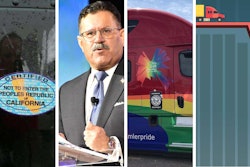For the third straight year, the implementation of the electronic logging device mandate loomed large as one of the most read topics on Overdrive in 2018. Adjustments to personal conveyance rules, the beginning stages of potential hours of service reform and more also ranked as some of the most-read stories of the year.
Here’s a look at the top stories on Overdrive from each month of 2018.
January
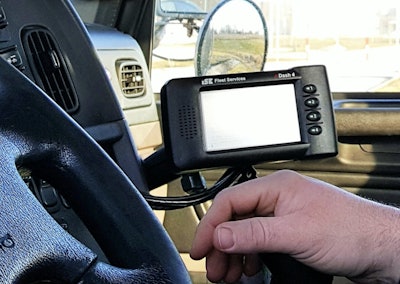 The year began with an exemption request from OOIDA for small business truckers from the ELD mandate.
The year began with an exemption request from OOIDA for small business truckers from the ELD mandate.The beginning of 2018 saw the end of a six-year-old lawsuit brought by five truckers challenging the efficacy of the U.S. DOT’s Pre-Employment Screening Program. The lawsuit was mostly dismissed by a federal court, but two drivers involved in the suit could have been awarded damages for information contained with their PSP report. The drivers in the case argued their PSP reports contained false information that could have been damaging to their job prospects.
Just two weeks after the ELD mandate took effect, a request from the Owner-Operator Independent Drivers Association seeking to exempt certain small trucking companies from the mandate opened for public comment. OOIDA asked the Federal Motor Carrier Safety Administration to exempt small businesses who have no at-fault crashes on their records and who have a “Satisfactory” or “Conditional” safety rating.

The DOT in January also announced it would be surveying truck drivers about the time they spend commuting in their personal vehicles, seeking to determine how often truckers’ commutes to their driving jobs exceed two-and-a-half hours.
February
 Peterbilt introduced its UltraLoft sleeper configuration for Model 579 tractors.
Peterbilt introduced its UltraLoft sleeper configuration for Model 579 tractors.Peterbilt unveiled in February its UltraLoft sleeper configuration for its Model 579 tractors. The new 80-inch sleeper configuration was added to enhance ergonomics and driver comfort. The sleeper was announced to be available in single- and dual-bunk configurations, and it comes standard with 70 cubic feet of storage space with an additional 14 cubic feet of shelving available on the single-bunk configuration.
Back on the ELD front, legislators in several states in February introduced proposals to block enforcement of the ELD mandate by either suspending funds for enforcement within their state or asking the federal government to reconsider the mandate. The bills mostly cited concerns of small business truckers as reasons to repeal the mandate or suspend its enforcement.
The California Air Resources Board in February announced carriers domiciled in the state with trucks older than 2011 model, or using engines manufactured before 2010, would have to meet the Board’s Truck and Bus Regulation beginning in 2020, or their trucks would be blocked from registration. A new enforcement tool used by the California DMV beginning in 2020 will automatically block 2010 and older trucks from registration, requiring the trucks to either be replaced by a 2011 or newer truck or repowered with a 2010 or newer engine.
March
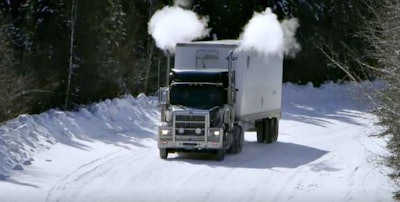 The History Channel’s Ice Road Truckers was not renewed to return after its 11th season.
The History Channel’s Ice Road Truckers was not renewed to return after its 11th season.FMCSA in March clarified the return-to-duty procedure following an ELD out-of-service order. While the mandate had been in effect since December, inspectors weren’t issuing out-of-service orders for ELD violations until April 1. The updated guidance said drivers would be placed OOS for 10 hours, then would be allowed to deliver the load they were under, but had to be compliant with the ELD mandate before being dispatched on their next trip.
News came down in March that one of the longest-running and most successful reality TV shows, Ice Road Truckers, could be coming to an end. The show aired on The History Channel for 11 seasons, but it was not renewed for a 12th.
Overdrive Senior Editor Todd Dills dove into how to combat dishonest brokers in a five-part series in March. Overdrive polling found that nearly all respondents had encountered some form of fraud or abuse from brokers. Some advice given by owner-operators was to ask more questions during negotiations to help weed out crooked brokers.
April
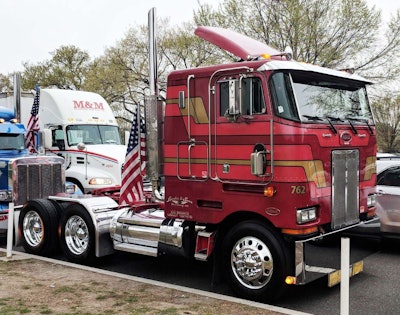 Landis & Sons owner-operator Mike Landis’ 1999 Peterbilt parked up on Constitution Ave. for further demonstrations and attendant meetings with regulators and lawmakers around hours regulations and the ELD mandate. Photo courtesy of Landis.
Landis & Sons owner-operator Mike Landis’ 1999 Peterbilt parked up on Constitution Ave. for further demonstrations and attendant meetings with regulators and lawmakers around hours regulations and the ELD mandate. Photo courtesy of Landis.Grassroots groups of owner-operators and truckers descended on Washington, D.C., with between 30-40 power units to express their concerns to the public, lawmakers and regulators over the ELD mandate and the need for hours flexibility. One trucker was Tased and arrested during the event.
With ELD mandate enforcement beginning in April, FMCSA updated the CSA SMS to add ELD violations and severity weights. The agency associated ELD violations with the Hours of Service Compliance BASIC in the SMS.
A truck driver was sentenced in April to two concurrent life sentences without parole for his role in the deaths of 10 immigrants while being transported in a tractor-trailer without a working reefer unit in San Antonio in July 2017. James Matthew Bradley Jr. had pleaded guilty to two counts of conspiracy to transport undocumented immigrants for profit, resulting in death.
May
 The ELD mandate seemingly exacerbated the already growing problem of lack of parking along major corridors across the country.
The ELD mandate seemingly exacerbated the already growing problem of lack of parking along major corridors across the country.In May came some anecdotal evidence of a lack of leniency from law enforcement when it comes to ELDs. Owner-operator Tom Werner was placed out-of-service for 10 hours for an “honest mistake” in his logs when he forgot to switch to off-duty one night. The error put Werner over his 70 hours on-duty, and after explaining the error to an officer, he was still shut down for the mistake.
FMCSA announced in May it would allow drivers to enter into personal conveyance status, whether the truck was loaded or unloaded, to find the nearest safe parking or rest locations after their hours of service are exhausted by a shipper/receiver, or when off-duty periods are interrupted by law enforcement.
The ELD mandate had the unintended effect of adding pressure to the parking situation along busy corridors across the U.S. Rigid application of hours of service under the mandate forced truckers to park for their 10-hour off-duty period, mostly in overnight hours, filling truck stop parking lots.
June
 Five men were charged for disabling emissions control devices on trucks.
Five men were charged for disabling emissions control devices on trucks.A trucking company owner, a repair shop owner and three others were charged with conspiring to defraud the United States and violate the Clean Air Act for disabling emissions control devices. The accused allegedly removed the stock exhaust systems and replaced them with straight pipes or hollowed out the emissions exhaust components by removing environmental filters and elements.
The Environmental Protection Agency was asked by lawmakers from the U.S. House to investigate potential improper contacts between EPA staffers and Volvo Trucks regarding research into glider kit truck emissions.
Two truck stops – one in Louisiana and one in Missouri – were destroyed by fires. The Bayou Truck Stop and Casino off of I-10 just north of New Orleans was almost completely destroyed. A Pilot Flying J travel center in Matthews, Missouri, was a total loss after the building’s roof caved in during a fire.
July
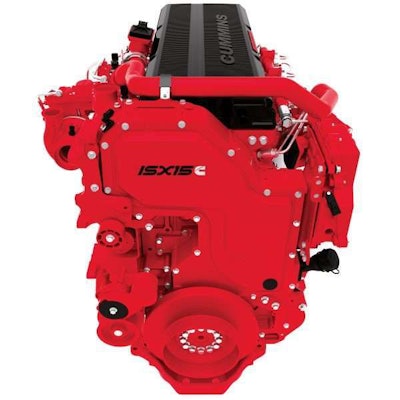 Cummins instituted a recall of approximately half a million engines over faulty emissions systems components.
Cummins instituted a recall of approximately half a million engines over faulty emissions systems components.The EPA in early July said it would not enforce Obama-era emissions restrictions placed on glider kit manufacturers at least through the end of 2019. However, two weeks later, a federal court blocked EPA’s decision, forcing glider kit manufacturers to comply with the 300-truck limit.
Cummins recalled approximately 500,000 model year 2010-2015 engines over faulty emissions systems components that cause the engines to fall out of compliance with federal emissions regulations. In financial reports released by Cummins, the trucks and engines involved in the recall saw degradation of their selective catalytic reduction systems, which are the exhaust aftertreatment components that use DEF to curb emissions of nitrogen oxides and greenhouse gases.
The town of Rocky Mount, North Carolina, passed an ordinance July 9 banning truck drivers from parking their rigs at their residences. More specifically, the ordinance banned the parking of commercial vehicles and/or trailers longer than 25 feet or weighing more than 10,000 pounds in residential areas.
August
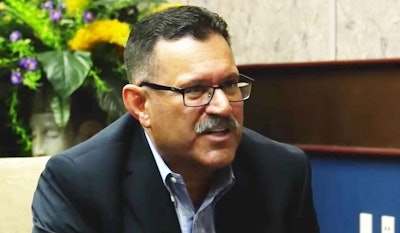 FMCSA Administrator Ray Martinez opened dialogue with the trucking industry for potential reforms to hours of service regulations.
FMCSA Administrator Ray Martinez opened dialogue with the trucking industry for potential reforms to hours of service regulations.FMCSA head Ray Martinez said in an exclusive interview with Overdrive in August that he was looking to open dialogue on altering hours of service regulations to give truck drivers more flexibility. Later in the month, FMCSA did just that by beginning the official process to reform hours of service by publishing a “pre-rule” in the Federal Register seeking feedback from the industry on potential changes to the regulations.
FMCSA’s Office of Enforcement Director Joe DeLorenzo at the Great American Trucking Show urged drivers to be familiar with the ELD in their truck for roadside inspections. “The more the driver knows” about the specifics of the device he/she is using, DeLorenzo said, “the better off the inspection will go.”
The agency also announced in August it would be reducing Unified Carrier Registration fees in 2019 because annual revenues from the fees had exceeded the maximum allowed ($112 million). With the new fees, carriers with one or two trucks would pay $63, and carriers with three-to-five trucks would pay $187.
September
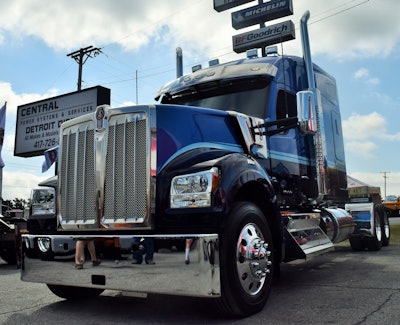 Kenworth unveiled its new W990, the next truck in the iconic W900 line.
Kenworth unveiled its new W990, the next truck in the iconic W900 line.Kenworth unveiled the next truck in its W900 line, the W990, at an event at Las Vegas Motor Speedway on Sept. 27. Kenworth General Manager Mike Dozier assured attendees the truck isn’t replacing the iconic W900L, noting, “The W900L’s not going anywhere.”
In more regulatory news, FMCSA proposed a rule that would, if made final, set criteria by which it could immediately revoke the operating authority of brokers and freight forwarders whose surety bonds or trust funds fall below the federally required $75,000 minimum. The proposal was in response to the six-year-old MAP-21 highway funding law, which required FMCSA to take steps in bolstering the solvency of brokers and to weed out those who aren’t.
A fatal crash in New Mexico involving a Greyhound bus and a tractor-trailer was likely the result of a steer tire blowout on the truck, according to NTSB in September. The crash occurred in late August and killed eight people. The truck reportedly blew the driver’s side steer tire, crossed the I-40 median and collided head-on with the bus.
October
 Amos Phillips received head wounds and a brain injury after a man broke into his truck, demanded money and beat him.
Amos Phillips received head wounds and a brain injury after a man broke into his truck, demanded money and beat him.Owner-operators got some good news in October when the Internal Revenue Service announced it had bumped meal per diem to $66 per day, up $3 from the previous amount. The new per diem meant owner-operators could deduct $52.80 off of their income for every day they’re on the road and away from home.
Overdrive reported in October on the bludgeoning of a truck driver while he was asleep at the T P Gas & Truck Stop on I-15 near Pocatello, Idaho. Amos Phillips was taking his 34-hour restart when an intruder broke into his truck in the middle of the night and demanded money. The assailant pounded Phillips’ head with rocks before Phillips was able to get the intruder out of his truck. The intruder later turned himself in and was identified as 23-year-old Stormy Adakai.
Truckers once again descended on Washington, D.C., in October for “That’s a Big 10-4 on D.C.,” an event meant for truckers to meet with lawmakers about hours of service reforms. The group of approximately 50 bobtails got some mixed reactions when, on their way out of D.C., staged a couple of brief traffic stoppages.
November
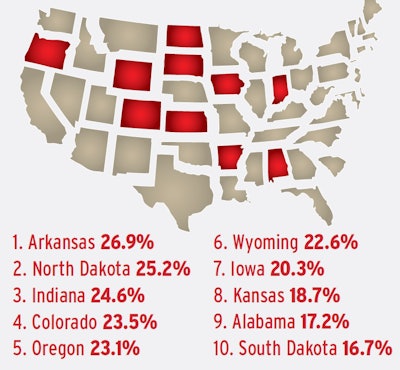 The top 10 states for hours of service violations.
The top 10 states for hours of service violations.The U.S. Department of Transportation announced in November it would be increasing fines for trucking regulations violations, adjusting the fines for inflation. The penalties are adjusted each year based on inflation. The multiplier this year, based on a year-over-year change in the Consumer Price Index for All Urban Customers was 1.02041.
Hours of service are always a hot topic among truckers, and an Overdrive graphic published in November identifying the 10 states with the highest percentage of hours violations was no different. Arkansas led the way with 26.9 percent of all violations being for hours violations, followed by North Dakota, Indiana, Colorado and Oregon.
With the status of California owner-operators in question following a California Supreme Court decision in April, fleets and owner-operators found a way to get around the ruling and continue business as usual. The court effectively barred operators from leasing on to carriers, so previously single-truck operators leased to carriers began obtaining their own authority, then running freight for the carrier they were leased to with its brokerage.
December
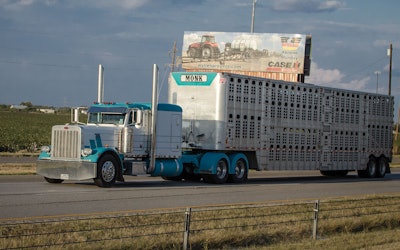 Livestock and insect haulers were told in December they could use paper logs “until further notice” while regulators sort out how the ELDs should work with live hauls.
Livestock and insect haulers were told in December they could use paper logs “until further notice” while regulators sort out how the ELDs should work with live hauls.FMCSA announced its decision in December to deny 10 ELD exemption requests from a variety of trucking organizations and fleets. Among the groups to be denied were OOIDA, the Power and Communication Contractors Association, Western Equipment Dealers Association, Association of Energy Service Companies, Cudd Energy Services, SikhsPAC and North American Punjabi Trucker Association, American Disposal Service, Towing and Recovery Association of America, National Electrical Contractors Association and Agricultural Retailers Association.
An Arkansas judge ruled that drivers should be paid at least minimum wage for time spent off-duty and in their sleeper berths. The ruling, however, doesn’t institute any new requirements for carriers, but it could open the door to lawsuits brought by drivers. The ruling stated that sleeper berth time is compensable under the Fair Labor Standards Act.
After a year-long saga of ELD exemptions and exemption extensions, FMCSA announced Dec. 13 that livestock and insect haulers could continue to run on paper longs “until further notice.” The agency also noted the livestock haulers don’t have to carry documentation for the exemption.
